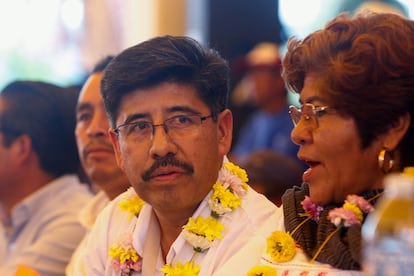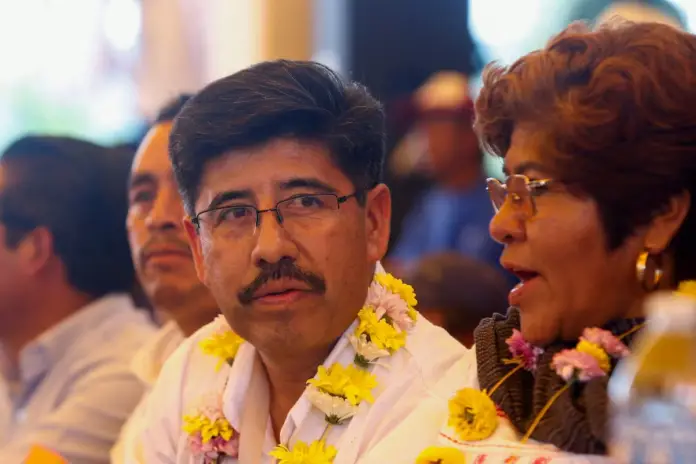A lawyer of Mixtec origin, a speaker of the language of rain, Tu’un Savi, has turned the tide in the race for the presidency of the Mexican Supreme Court of Justice. With 86% of the votes counted by the National Electoral Institute (INE), Hugo Aguilar Ortiz has placed himself at the top of the race for justices of the Mexican Supreme Court with 4.5 million votes, equivalent to 5.2% of the vote. This puts him ahead of Lenia Batres, who is in second place with 4.9% and aspiring to preside over the highest court. As of press time, the race remained close, with 227,000 votes, a three-point difference between first and second place. The jurist, who has made a surprising appearance on the judicial scene, has spent three decades defending indigenous peoples. He currently serves as the general coordinator of Indigenous Rights for the National Institute of Indigenous Peoples (INPI). His resume includes participation in the National Indigenous Congress as part of the advisory body of the Zapatista Army of National Liberation (EZLN) during the San Andrés Larraízar talks, during the peace talks in Chiapas (1996). His participation as an advisor was on behalf of the organization Servicios del Pueblo Mixe, with which he collaborated during those years, he said in an interview.
Aguilar Ortiz placed 34th out of 64 candidates on the ballot for the election to the Court and has been one of the candidates nominated by the Executive Branch. He holds a bachelor’s degree in law and a master’s degree in Constitutional Law from the Faculty of Law and Social Sciences of the Benito Juárez Autonomous University of Oaxaca. The lawyer has burst onto the scene in the election, radically changing the odds that placed Batres as the big winner, taking home the crown jewel, the presidency of the Supreme Court, in an election that achieved 13% turnout among the 99.8 million eligible voters.
The litigator has given a glimpse into what his work will be like on the Court. Aguilar Ortiz will not wear a toga, the vestment worn by Supreme Court justices, according to local media. “It’s something they repeatedly asked me in the towns I visited, that I not become a traditional official,” the virtual justice explains.
The lawyer’s cover letter emphasizes the legal representation he has had for some twenty indigenous communities in Oaxaca, supporting conciliatory and jurisdictional processes to resolve territorial disputes between indigenous peoples. He has held public positions in agencies defending indigenous communities, including the Secretariat of Indigenous Affairs of the Government of Oaxaca.
If the trend in the district counts continues, the defender of indigenous peoples will replace Norma Piña as president of the Supreme Court. This position positions him as the next leader to lead a new era of a judiciary that has been refounded with the election of judges, magistrates, and justices by popular vote.
Aguilar Ortiz has recorded his motivations and campaign proposals on the INE website. His aspiration to reach the Supreme Court has been based, he says, on his vocation to serve justice and indigenous peoples. The lawyer has outlined some of his ideas on the platform provided for public awareness. “Justice should not be based on the simple application of the law.” This is how he began his response to the question, “What is your vision of the administration of justice?” The lawyer advocates for a profound transformation in the way justice is administered, prioritizing closeness with people, direct dialogue, and seeking to leave formalities aside.
The district counts have resulted in a jumble similar to the complex voting process. The figures and percentages have raised questions about the actual votes with which the candidates will win their positions. In the specific case of the Supreme Court election, each voter is equivalent to up to nine votes, the number of justices eligible. Therefore, spoiled votes have exceeded the total votes obtained by the first and second place candidates. Aguilar and Batres combined for 9.4 million votes, compared to 10.1 million votes that have been spoiled for various reasons, including crossed-out ballots, missing numbers, and inscriptions, among others.

Source: elpais




